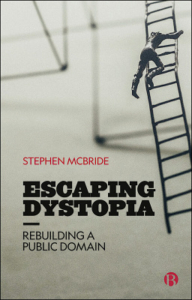A leading dictionary has identified ‘permacrisis’ as its word of 2022. Defined as an ‘extended period of instability and insecurity, (especially) one resulting from a series of catastrophic events’, it often carries with it the connotation that the multiple and interconnected crises we are experiencing are situations that are not controllable or resolvable.
Certainly, the list of such crises – climate, health, economic, war, migration and political (the ineffectiveness of political leadership and dysfunctionality of liberal democratic institutions) – is daunting.
Endless upheavals resulting from the health pandemic, climate disasters, war and economic instability have led to real hardship for millions. Food shortages and hunger in the developing world, inflation, heating costs and likely recessions in the developed world will further hammer living standards everywhere, especially among the most vulnerable. Death, dislocation and migration are daily realities in over 40 war zones around the world. Understandably, there is widespread anxiety and foreboding about the future. These are genuine existential crises. Climate change threatens human life on Earth. Wars and conflicts, as bad as they already are, could swiftly escalate to the nuclear level.
Side by side are the ‘normal’ compulsions of inequality, poverty, precarious employment and diminishing opportunities for the many, while the richest one per cent of humanity has captured half of new global wealth in the last ten years, increasing to two thirds since 2020.
How did we get here? Can the permacrisis be resolved?
The root cause lies in the system of global capitalism and its neoliberal rationale which has emboldened the maximisation of wealth and power through unlimited endless pursuit of profit, whatever the consequences for the environment; reckless financialisation of the economy that has produced booms and busts, threatening system collapse; and a hierarchical rules-based international order that assigns some states the role of rule makers and others that of rule takers.
Social cohesion has been a victim of inequality and diminution of public provision and decision making.
Within liberal democratic systems, much of the population is effectively without voice or influence and finds itself, as in the case of austerity, paying the price of a crisis it had nothing to do with creating. Environmentally we face a catastrophic near-term future. The security order has been ruptured by the conflict in Ukraine and it, and the associated western sanctions, have surely ended the liberal international economic order.
Political systems are part of the problem rather than the solution. Take the politicians themselves – rarely can the world have been governed by leaders so mediocre, incompetent and ignorant (of history, economics and even as Ms Truss demonstrated, basic geography). But more important is the lack of representation and accountability in liberal democratic institutions. States and international organisations have functioned as the blunt instruments of capital, with their behaviour shaped by neoliberal ideas (privileging markets and private goals over public ones). After more than four decades, it’s time to assign responsibility where it belongs.
Liberal democratic institutions have been stripped of functions through international agreements that empower capital while constraining the nation state. The depoliticisation of state functions has been reinforced by domestic political trends. In political parties, membership control is now a fantasy; party machines and professionals control the apparatus. Parties offer little choice of programmes (just of leaders) and few trust that promises (if any are made) will be kept.
The rise of antisystem parties, often right-wing populist, is a symptom of the political crises. Wrong about virtually everything, the right populists are correct on one point – a void exists between leaders and led.
Can we escape? To what, and how?
Political and economic elites continue to claim that markets, left mainly to self-regulate (but pumped with public subsidies to incentivise the private sector) will naturally stabilise matters. This is the formula that has led to the edge of catastrophe. Returning to ‘normal’ is a recipe for disaster.
Permacrisis could lead to more constructive change. Crises are dire situations but can also be revealing moments in which things that were previously obscure come to be seen more clearly. And, in a medical analogy, a crisis can be a turning point in the development of a disease.
Radical transformation of the system is necessary to overcoming the multiple crises. Achieving it depends on the assertion of popular sovereignty over the sovereignty of capital. That will involve imposing controls on capital and rebuilding the public domain and state. A key element will be the transformation of existing political institutions that are demonstrably unfit for purpose.
Goals need to shift from guaranteeing private profit maximisation to the construction of a prosperous and socially just economy functioning in a context of environmental sustainability. Imposing controls on capital and building up the public domain are the key. This will also involve the construction of a new international order based on different principles from the existing one, which in any case has disintegrated.
Can such a shift be achieved?
If it can’t, the permacrisis continues and the future will be dire indeed.
Stephen McBride, Canada Research Chair in Globalization and Public Policy.
 Escaping Dystopia by Stephen McBride is available on the Bristol University Press website. Order here for £14.99.
Escaping Dystopia by Stephen McBride is available on the Bristol University Press website. Order here for £14.99.
Bristol University Press/Policy Press newsletter subscribers receive a 25% discount – sign up here.
Individual chapters from the book are available for purchase from Bristol University Press Digital. You can also ask your library to subscribe or sign up for a free trial.
Follow Transforming Society so we can let you know when new articles publish.
The views and opinions expressed on this blog site are solely those of the original blog post authors and other contributors. These views and opinions do not necessarily represent those of the Policy Press and/or any/all contributors to this site.
Image Credit: smartboy10 via iStock


